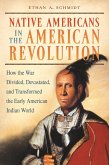Contrary to common understanding, in the backcountry at least, the American Revolution was fought over land rather than democratic ideals. In this book, historian Walter Dunn reveals the true nature of the conflicting interests on the frontier, demonstrating that the primary issues there, land and the fur trade, were, in fact, the basis of the conflict between the local colonists and Britain. Diverse Indian groups, wealthy land speculators, humbler settlers, fur traders, and the British government all had conflicting designs on the rich lands west of the Appalachian Mountains. The conflict on the frontier during the Revolution has been described as one of heroic settlers defending their farms against attacks by the British army, the Tories, and the Indians. In truth, the situation was far more complex. For many on the frontier, the primary motive for fighting was not defending farms, but acquiring vast tracts of land for later resale at enormous profit. Native Americans, in contrast, were motivated by the desire to retain control of their homeland, for without their hunting grounds and cornfields, they would starve.
Going beyond accepted theory, Dunn explores why those on the frontier reacted to the conflict as they did. He demonstrates how the various economic groups were forced to decide whether they should side with Britain or the colonists or if possible remain neutral, and the forces that governed those choices. Finally, he reveals how the decisions made on the frontier during the Revolution had a lasting impact on the post-war situation in the West, delaying western expansion by nearly two decades.
Going beyond accepted theory, Dunn explores why those on the frontier reacted to the conflict as they did. He demonstrates how the various economic groups were forced to decide whether they should side with Britain or the colonists or if possible remain neutral, and the forces that governed those choices. Finally, he reveals how the decisions made on the frontier during the Revolution had a lasting impact on the post-war situation in the West, delaying western expansion by nearly two decades.









